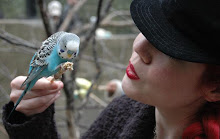Allow me to introduce myself. As a relative newcomer to After Dark, and to Natasha's fabulous life, I happily and humbly invite you into my world of embracing science and art. Growing up with a family of artists, it was natural for me to spend time in my father's art gallery or surrounded by my mother's artwork. My identical twin brother is a brain imaging scientist and professor at Columbia University and my older sister is a marvelous musician and luthier at her violin shop, Korinthian Violins. As for me, at five years old I became enamored with insects and have retained a love of insects ever since. Almost everything I have accomplished, from making natural history displays at Chase Studio and the American Museum of Natural History (AMNH), to teaching and conducting behavioral research, has revolved around insects.
While my dissertation involves SLEEP behavior in honey bees...
It is difficult to focus exclusively on my honey bees when so many opportunities arise bringing science and art together. Here are two:
Faux Frogs -- the study of mate selection by female frogs in Panama, using robots. I make the frogs and Joey Stein (of Moey Inc) makes a computer-controlled unit that regulates the singing and inflation of the faux frog's vocal sac.
Illustrating a damselfly field guide, written by John Abbott:

It was only natural for me to be drawn to Natasha and to After Dark's creations. With an affection and admiration for nature, Natasha shares my desire to uniquely and esthetically incorporate and highlight nature in art. It is a privilege for me to join After Dark and to be able to introduce myself to you, After Dark's international family.
Now that you know who I am, I can share with you one odd evening here at After Dark:
The night we celebrated ANTS.
The occasion? Fellow ant biologist Sasha M. is moving. A festival honoring ants (and Sasha) was long overdue. The venue? After Dark's H.Q., nestled in the pulsating heart of Austin. How to celebrate our ubiquitous neighbors, those six-legged animals with a keen sense of smell, efficient division of labor, and profoundly social organization? We decided that a fitting honor would take several forms through the night, including what must be Austin's very first ANT OLYMPIAD, followed by readings, and potluck film feast! As an entomologist interested in insects' impact on human culture, I had an easy time selecting the haute couture for the phantasmagoria: Readings, simultaneously in French and English: Bernard Weber's Empire of the Ants.
Potluck: Feast befitting of ants, including Liz M's Ants on Logs.
Films: Our cinematic entertainment included The Naked Jungle, followed by Phase IV.
The Naked Jungle: 1954 classic in which Charlton Heston is no match for either a raiding mass of Amazonian army ants OR the acting skills of his female lead.
Phase IV is a 1974 trippy feature starring an inexplicable (and, for the most part, unexplained) takeover of planet Earth by an unprecedented association of different ant species (led by a spider wasp queen, for good measure). The arms race between a pair of human scientists and their intelligent ant adversaries inspired awe, fear, and respect (if not from some of our audience, at least from the scientists within the film). The classic film THEM! would be left for Ants: The Sequel, to be planned at a later date.
The MAIN EVENT for the evening, however was a test of wits and skills. We set up the equivalent of an 800 meter human sprint competition, but instead of pitting one political regime against another, we set up a single elimination tournament across SPECIES of ants.
INSTRUCTIONS:
Step 1: Collect ants from front yard. Upon cursory examination, you might naively assume that a tiny ant is a tiny ant and that your front yard consists of one species of tiny ant. Take a closer look. We used vials, a magnifier (20x with LED light), and gathered five species of ants belonging to four different genera within minutes of starting our search. (If you don't have an expert ant biologist on hand, distinguish species by gross anatomical differences, being careful not to race one member of a colony against her larger sister).

Step 2: Ant wrangling. Insert one ant from each genus into one end of a clear PVC tube, small diameter preferable. Pinch tube both behind and in front of ant until the racing gun goes off. Dramatically fling currency on racing table (for effect), choose sides, and feel the weight of imminent victory or defeat in the air.

Step 3: Once a victor has been determined for each heat, continue until one champion obliterates her competition, then allow your adrenaline levels to drop, and carefully return each ant to her respective point of collection in the front yard.
THE PLAYERS:
Tree-dwelling, common predator of unusual size and uncanny ability, the carpenter ant is able to surmount vertical surfaces with aplomb. This ant is known to unmercifully chomp wood.
Twisting, weaving, and evasively maneuvering, the acrobat ant dances with unpredictable grace. She holds her rear end high over her body while on the run.
The bane of many humans, this fiery mound-builder should serve as a harsh reminder that this ant is not to be trifled with.
Miniscule, will this tiny adversary overcome her larger competition? Before you dismiss her, remember Bruce Lee's sage advice when locals were betting on fighting mantids in Enter the Dragon.
Who was our Austin ant CHAMPION?
Stay tuned for the answer in the next blog installment...
and feel free to cast YOUR vote!

















My vote goes for the Brachymyrmex and Phase IV.
ReplyDeletethe films are the winner. I will train ours LA species for first interstate ant olimpics coming next!
ReplyDeletehugs
cata